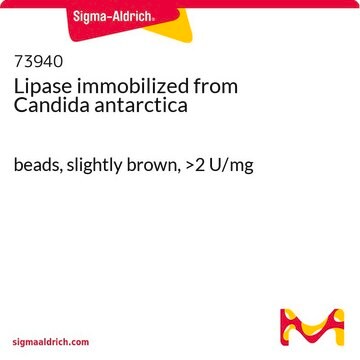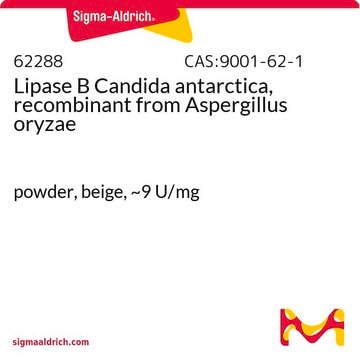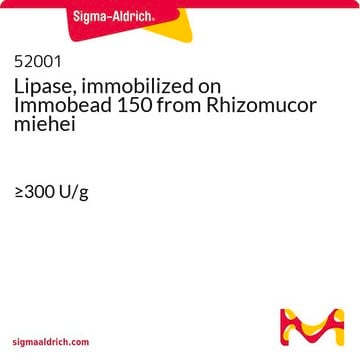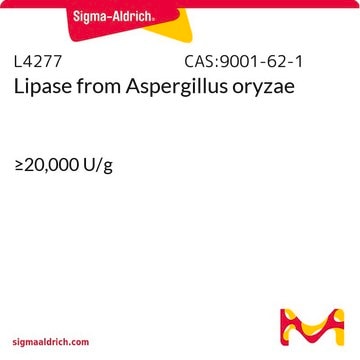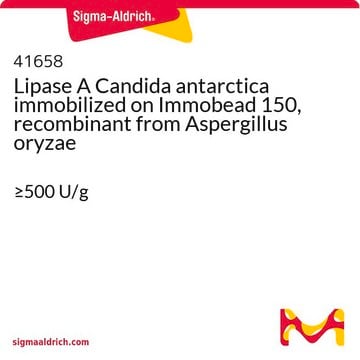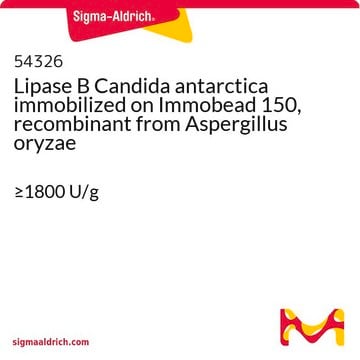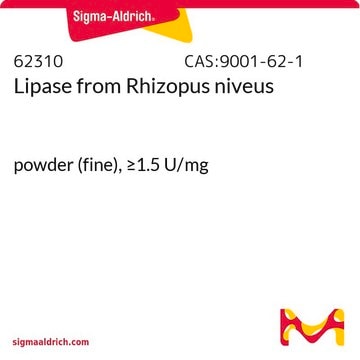76546
Lipase, immobilized on Immobead 150 from Thermomyces lanuginosus
≥3000 U/g
Synonym(s):
Immobilized lipase, Lipase enzyme
Sign Into View Organizational & Contract Pricing
All Photos(1)
About This Item
UNSPSC Code:
12352204
NACRES:
NA.54
Recommended Products
biological source
fungus (Thermomyces lanuginosus)
form
powder (or beads)
specific activity
≥3000 U/g
technique(s)
analytical sample preparation: suitable
color
white to off-white
application(s)
life science and biopharma
storage temp.
2-8°C
General description
Research area: Cell Signaling
Lipase from Thermomyces lanuginosus (TLL) is a basophilic, single-chain protein and thermostable enzyme. It belongs to the alpha/beta-hydrolase fold family. TLL is roughly spherical and is made up of a central seven-stranded β-parallel sheet with five interconnecting α-helices.
Lipase from Thermomyces lanuginosus (TLL) is a basophilic, single-chain protein and thermostable enzyme. It belongs to the alpha/beta-hydrolase fold family. TLL is roughly spherical and is made up of a central seven-stranded β-parallel sheet with five interconnecting α-helices.
Application
Lipase, immobilized on Immobead 150 from Thermomyces lanuginosus has been used:
- as a biocatalyst to study ultrasound-assisted transesterification of a blend of non-edible oils with methanol.
- as a catalyst in the synthesis of medium chain fatty acids (MCFA) and polyunsaturated fatty acids (PUFA) rich oils by enzymatic structuring of flax seed oil.
- for the resolution of chiral compounds and the transesterification production of biodiesel.
- to enhance the efficiency and selectivity of the enzymatic synthesis of ethyl-(R)-2-hydroxy-4-phenylbutyrate, (R)-HPB ester.
- to facilitate a chemoenzymatic process for the continuous synthesis of (S)-7-((tert-Butyldiphenylsilyl)oxy)hept-1-yn-4-ol, a crucial intermediate for Eribulin synthesis, within a packed-bed reactor setup.
Biochem/physiol Actions
It participates in catalyzing the hydrolysis of triglycerides at the water-lipid interface and produces mono-, di-glycerides, and free fatty acids. Due to its versatility, this enzyme is applicable in various industries including, detergents, paper, leather, baking, fine chemicals, fuel, and biocatalysts.
Lipases catalyze the hydrolysis of triacylglycerols into glycerol and free fatty acids.
Unit Definition
1 U corresponds to the amount of enzyme which liberates 1 μmol butyric acid per minute at pH 7.5 and 40°C (tributyrin, Cat. No. 91010, as substrate)
Storage Class Code
11 - Combustible Solids
WGK
WGK 3
Flash Point(F)
Not applicable
Flash Point(C)
Not applicable
Personal Protective Equipment
dust mask type N95 (US), Eyeshields, Gloves
Certificates of Analysis (COA)
Search for Certificates of Analysis (COA) by entering the products Lot/Batch Number. Lot and Batch Numbers can be found on a product’s label following the words ‘Lot’ or ‘Batch’.
Already Own This Product?
Find documentation for the products that you have recently purchased in the Document Library.
Customers Also Viewed
Chemoenzymatic Process for the Preparation of (S)-7-((tert-Butyldiphenylsilyl)oxy)hept-1-yn-4-ol in a Continuous Packed-Bed Reactor, a Key Intermediate for Eribulin Synthesis
Krishna AS, et al.
Organic Process Research & Development, 24(11), 2657?2664-2657?2664 (2020)
An improved process for the preparation of ethyl-(R)-2-hydroxy-4-phenylbutyrate, (R)-HPB ester by lipase from Thermomyces lanuginosus
Basetty S, et al.
bioresource technology reports, 101163-101163 (2022)
Study of Thermomyces lanuginosa Lipase in the Presence of Tributyrylglycerol and Water
Santini S, et al.
Biophysical Journal, 96(12), 4814?4825-4814?4825 (2009)
Our team of scientists has experience in all areas of research including Life Science, Material Science, Chemical Synthesis, Chromatography, Analytical and many others.
Contact Technical Service
